The North Suburban Hammond Organ Society
Eastern Massachusetts Premier Group for Those Who Love the
HAMMOND ORGAN and OTHER
ELECTRONIC KEYBOARDS
Welcome to our new 2021 Concert Season.
And Now, we are newly located in
the auditorium of the FIRST BAPTIST CHURCH, 3 Winn Street, Woburn, MA
01801.
WE'RE BACK IN BUSINESS AGAIN!!!
Covid precautions shut us down for over a year, but I am happy to say that
we're back once again, and the next meeting will be Saturday, November 20 at 1:30 PM PM. Same time, but a new place!.
and will feature the NSHOS "Big Three JIM GREGORY, DON SANSOM & ERIC LARSON
Our next meeting and concert will take place on November 20, Saturday afternoon at 1:30:pm. And note this BIG CHANGE!!! We've moved!. We are now meeting in the lower church hall of the First Baptist church in Woburn. We are no longer at the senior center on school street. The New location is at #3 Winn Street in Woburn, just under three miles from where we have been meeting. Scroll down to the end of this text and you'll see an aerial view of downtown Woburn which shows the location of the church. Essentially it is at the corner where Winn Street and Main street intersect. Now, why did we make this move after being at the senior center for the last fifteen or so years?
It was because of a regulation that the city of Woburn imposed on the Senior center which was that at all times when any outside individuals or groups were at the Senior Center, there would have to be a City employee on the premises, and because Weekend afternoon days were days that the Senior Center was not normally staffed, this meant that a custodian, or another city employee had to be on the premises, and said individual was to be paid for a four hour minimum and paid at the current overtime rate, which, according to what I was informed about by a Woburn employee, would be a minimum charge of $200. Furthermore, if we were to go in to do a setup for a special program, we would generally have to do this during either an evening or a weekend day because the building is used so often for Senior center activities, so effectively, this could make a special program cost us up to $400.
There is no way that we can afford to pay this amount; just a few meetings at this rate would wipe out our funds, so we initially decided to stay with weekdays for a while. As many of you know, we were meeting on Friday afternoons. More recently, we tried a few meetings on Wednesday afternoons, but in either case, weekday meetings severely decimated our attendance. This also eliminated all except those people who were either self-employed or retired.
Therefore, after careful deliberation and discussion among the principals of the NSHOS, we decided to find a different location that would make weekend meetings possible, and also allow us to come in on the day or evening before a program and set up equipment. Few things are worse than what had happened on a number of previous occasions, where we would go in maybe an hour or so before a program, and try our best to set up instruments and sound equipment, only to find that we were still dealing with last minute problems when our guests were already arriving. And as several visitors remarked, "We came in for the program, not to watch you guys set things up."
The senior center treated us very well. They were always cooperative, in particular, Paul, the custodian, who was always supremely helpful in helping us move and set up heavy items. And the management of the Senior Center did approach the city officials on our behalf, but as the old saying goes, "you can't fight city hall," and thus we were denied weekend access. So our Secretary, Elizabeth Larson made a number of calls to area churches, and the First Baptist Church in Woburn responded favorably to our request and will allow us to hold our meetings in the lower church hall which is on the floor below the main sanctuary.
It is a nice, well lit room, perfectly suitable for our activities. There is a parking lot behind the building which is easily accessible, and the parking lot is on the same level as the hall with just three steps down, so this also means that it is easily accessible for any guests who may have special mobility needs.
It is no secret that attendance is way down. Within two months of the time that we could no longer use the senior center on Sunday afternoons, we saw attendance plummet to about half of its previous level. A number of former members requested us to have either a Saturday or Sunday afternoon meeting, but the expenses that I cited above made that impossible, and thus many former members had to drop out. I am hoping now that as the word spreads, that we will once again begin to attract new members, now that we are back to weekend activities. Already I have found two new artists who will soon play for us; both of them were unavailable on weekdays, but now they can attend. Likewise, I expect that at least some of our former members may rejoin now that we are meeting on Saturdays instead of weekdays.
This also makes it possible for people who work during the week that they will likewise visit us, and this also, by virtue of being on a Saturday afternoon, will not interfere with plans of people who also belong to local chapters of the American Theater Organ Society, inasmuch as they traditionally meet on Sunday afternoons. Therefore, this now makes it possible for them to attend our programs also. So I am optimistic that this change will be beneficial to our group and help us to grow and in so doing put on many more programs and feature a lot of talent that was not available to us on weekdays.
Dues and guest fees increasing.
We've been resisting inflation for twenty or more years! But now we likewise have to capitulate to the facts. The reason for these fee increases, however, is simple. Our expenses have increased. Printing and mailing of program notices is more expensive now, and we are planning for more guest artists as well. We have not yet increased the guest artist fee from its current $100 level, but it may become necessary to do this as well. Some artists donate their time for concerts, but many, especially those who may travel a considerable distance can not afford to be that generous, and if we start getting artists from farther away, where they may have to travel a considerable distance, and especially those who depend on fees for concerts for their income, we likewise need to make it worth their while to attend and perform for us.
I have some plans for future programs that will involve artists who are based farther away from us than those whom we presently use, and I am hoping in time that we can once again increase our membership. Many people are, unfortunately, through various misconceptions, put off by the word "organ" associating all organ music with dirge-like music played in some small churches who can't afford to pay the salaries of really good church musicians, or as background music for funerals. We know, of course that this is not true for most pops that is played on Hammonds and other modern instruments, but unfortunately the stereotype still exists in the minds of many. I am hoping that we can be effective in eliminating this concept of the music we enjoy. I have seen on many occasions that young people, especially kids, when they see what is really possible, become instant enthusiasts of both Hammond and also theater pipe organs and want to learn how to play these instruments themselves. And modern keyboards can indeed be very impressive and versatile instruments in their own right, but the independence and artistic possibilities of the multi-keyboard organ with its associated pedals is still the ultimate one-performer instrument. Anyhow, I am really grateful to be resuming our NSHOS activities once again, and hope that as a group we will do well in our new home at First Baptist Church and continue to increase our membership as we continue to move forward.
HAMMOND B3 CDs For Sale!
The most famous Hammond organ is the legendary B3, and now for the first time we are offering a set of three CDs of standard popular music played exclusively on a B3. If you are a B3 aficionado, then these are for you! To find out more and also to purchase, Click Here.
NEW HAMMOND REPAIR SERVICE!
Something else we've started. In spite of the legendary reliability of traditional tone wheel Hammond organs, they do develop problems on occasion, and this often becomes a really serious problem for a Hammond owner who soon discovers that it is almost like winning the lottery jackpot to find a person who really understands Hammond organs, how they work, and what goes wrong with them, and especially how to fix Hammond problems. And, this is especially true of Hammond's most elaborate instrument, the X66, for even many of the few remaining people who service other Hammonds will not take on an X66. I have actually heard of instances where a Hammond X66 owner has had a nonfunctioning instrument removed as junk because he could not find anybody to repair it.
When I first became interested in Hammond organs as a young teenager, they appealed to me in two significant ways. You could make really nice music on a Hammond if you were willing to devote some serious time and attention to learning how and practicing diligently, and they were also fascinating electrical and mechanical machines. Since I as a kid was always interested in all things musical and all things mechanical, the Hammond organ was the perfect way for me to combine both interests, as was the pipe organ also. So I began to learn the technical side of the Hammond as well. How did this work? How does it do what it does? What does it look like inside? And when I did get my very first look inside an early model BC Hammond, I soon found that it was full of all kinds of interesting stuff which I had to find out as much about as possible. Anyhow, my early curiosity led me to pursue a detailed study of the Hammond both as an instrument and as a machine, and I eventually learned to understand this machine well enough to figure out how to correct problems that occasionally developed and eventually I became a service tech for several different dealers. Now, decades later, I see that there is a real need for somebody who understands Hammonds and the problems that they can develop, and also understands how to troubleshoot and repair them. So you will find a new page on this website devoted to Hammond organ repairs, and here is a direct link to that page. I can't travel all over the USA, and I can only be in one place at a time, but I invite you to call or email if you are encountering problems with your Hammond, and let's see what might be possible regarding getting that instrument playing well again. And I mentioned working for several dealers. Through that experience, I learned about a few other brands of electronic instruments as well, including the very rare Wurlitzer electrostatic instruments and some of the Gulbransen models as well. Anyhow, if you have a Hammond that has problems, or a non-functioning Wurlitzer electrostatic such as a 4600 or 4800, call or email. I may possibly be able to help you, and if I can't, there's no charge.
CRISIS!
Yes indeed, we are facing an artist crisis. Where is everybody who can play a Hammond Organ? We are running out of artists! If any of you who are reading these web pages can play pops music on an organ with a reasonable degree of proficiency, please let me know. You can contact me here: Contact Eric Larson and I check it at least once a day. We provide the instruments, all you need to do is provide yourself. Even if you only play at home for your own enjoyment, if others are genuinely complimentary when you play, then you have what it takes to play for our group. And if you've never played in public before other people, here's an opportunity to see what it is like. Try it, you might just discover that you really enjoy it.
When I first played for this group in the late 1960s as a kid, I'd get asked to come back every two years. In the 1980s, I'd get asked back every 18 months. Then it got to be once every year, and now I participate to some degree at almost every meeting, and we generally rotate through three or four people, and sometimes we have the same people back several meetings in succession.
Variety is what makes these programs interesting, and the way to get variety is to have a big artist roster. And also, there are a few really good theater organ artists out there. You play, you are really good at it, but since we offer Hammonds and not real pipes, evidently some of you may feel that Hammonds are not good enough for you. You may possibly be selfish and play exclusively for your own enjoyment. Ever hear the Biblical reference of "hiding your light under a bushel basket?" Well, that's what you are doing, and that is selfish. You could use your talent to bring musical joy to others, but the "lowly Hammond" is not good enough for you. Don't get me wrong, I love real pipes. My instrument of choice is a real theater pipe organ. No Hammond or any other electronic, even a big Allen electronic TO can truly compare with the real sound of the genuine. I admit it. But, lots of good and enjoyable music can be played on a Hammond, and many people like that as well. So how about it, TO players? How about playing some programs for us? You may just find that our two Hammonds will present new and interesting opportunities and ways to spread your talent (and your recognition!) but you won't know unless you try, so take that first step and e-mail me at eric@hornandwhistle.com and let's get you started.

Map view showing church location Park street, which takes you to the rear parking lot is immediately to the right of the church building as you see. when leaving the church, turn left on Park (which is a one-way street) and then left again at the end onto Franklin Street which will take you to Winn Street. Turn left on Winn to return to Main Street which is also Rt 38 which will bring you back to 128.95.

Aerial View of churchAerial view of the center of Woburn. The church is the building designated by the yellow arrow. In the picture, Arlington is to the left. Rte. 38 is Main Street. The church parking lot is accessible by entering the small street to the right of the church huilding which is Park Street. When attending one of our programs, use the first white door on the rear of the church building.
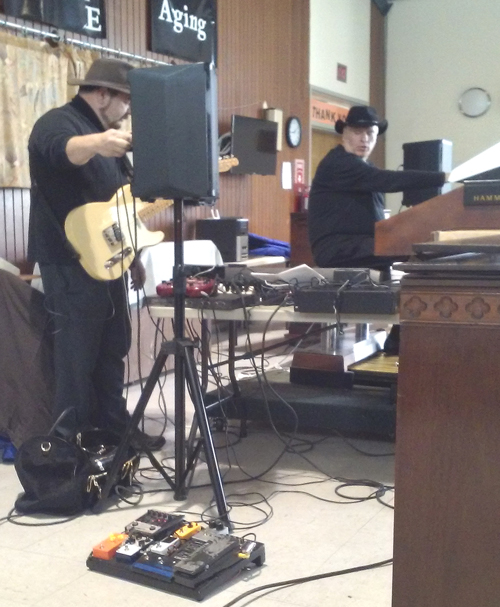
Figure 1. "Mike Stelzen and Jim Gregory doing some last second tweaks prior to playing at our January 2018 concert.
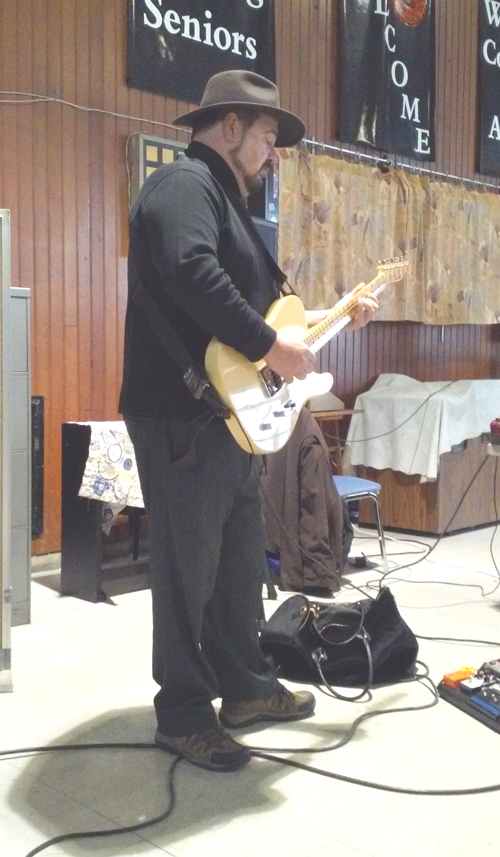
Figure 2. Mike Stelzen effortlessly making his guitar talk. I need to invest in a hat like that!
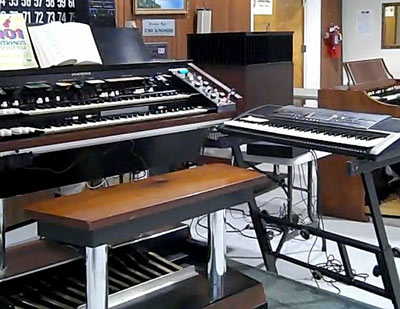
Figure 3. Ready for a concert! X66, Keyboard and in background, our former A100 Hammond Console.
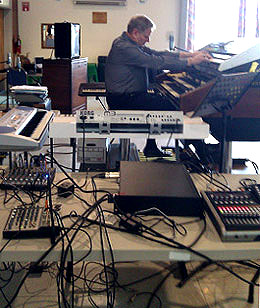
Figure 4. Surrounded by electronic equipment and keyboards, Jim Gregory entertains at our February 2017 concert.
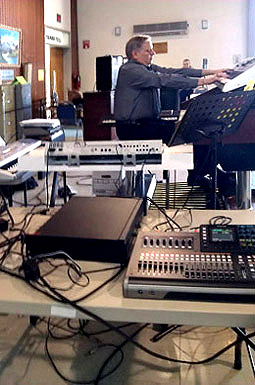
Figure 5. Notice the use of four MIDI equipped keyboards, one on the top of the X66 console, one one each side of Jim, and one behind. All were set up and Jim used all of them at various times in his program. Lots of stuff makes for lots of interest! We regularly think "outside the box" for our programs.
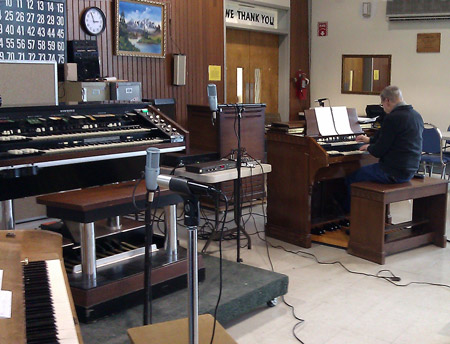
Figure 6. This is an over-all view of the setup we used for our December meeting. In the picture, group treasurer Ed Surette plays on the Hammond C2. A digital signal processor along with a mixer and power amplifier are on the center table, X66 console to left, and on extreme left, the house piano.